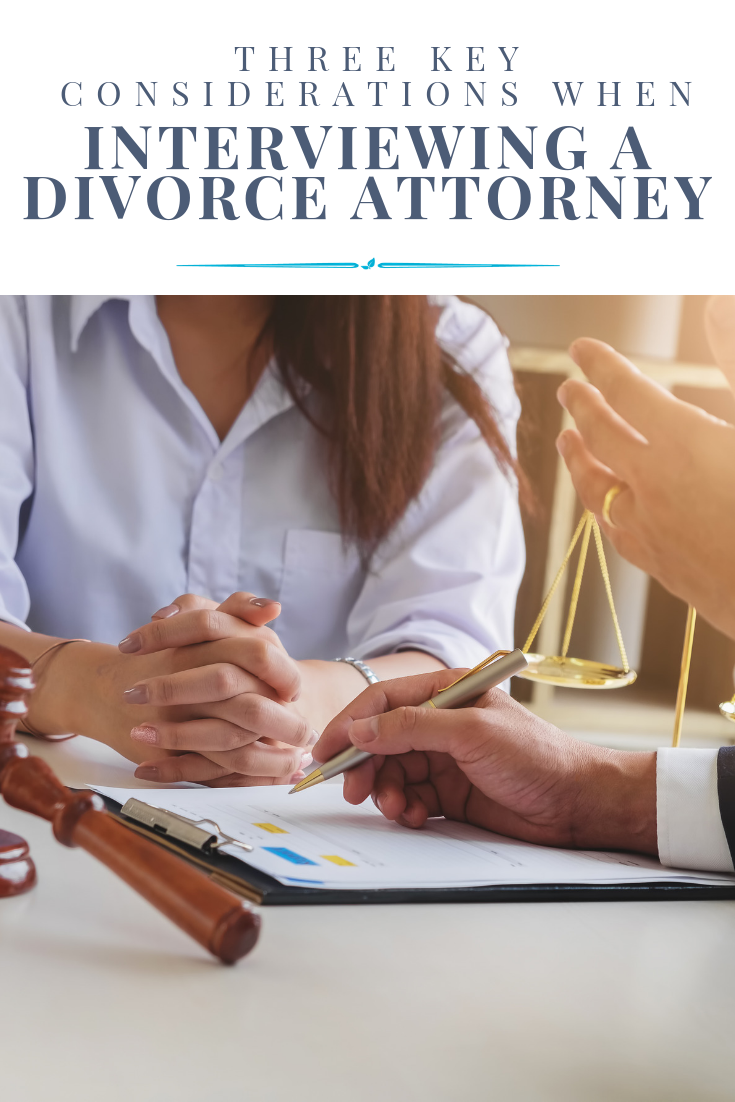Divorce is tough but selecting a divorce attorney should not be. A top-notch divorce professional will make the process less stressful for you and will serve as your guide and advocate through the experience. Here are some aspects to consider when you are interviewing a divorce attorney.

Reputation: What Are People Saying
Before you start interviewing potential divorce lawyers you found on Google, Yelp or other lawyer referral websites, start by talking to your network of steadfast family and friends (and neighbors and co-workers if you trust them enough to share what you are going through). Do not be afraid to ask them who they know by word of mouth, who they have worked with, and who handled a difficult case in an effective way. Most people will be eager to share if they had a negative experience, and will be even happier to share a positive one. Once you have a list of names to consider, move to phase two. Look at each attorney’s website to learn more about them and contact them for a consultation. Not every attorney has a comprehensive, eye-catching or illustrative website, but you can use the website to cross-check the referral and to get a look and feel for the attorney before meeting him or her in person.
Initial Consultation: What to Ask and What to Listen For
Commonly asked questions at an initial consultation include inquiries about how property is divided and how spousal or child support will work – especially as to how these frameworks fit a specific set of circumstances. Concrete and definitive responses are unlikely to flow in an initial consultation when a limited set of facts are known and time is finite. There are many fact-specific outcomes in family law and the details do matter. However, a qualified lawyer and agile communicator will be able to offer specific guidelines as to how these issues will be looked upon and determined by the court. You want to avoid overly generic responses which do not promote an overall sense of confidence that you will be in good hands.
I find it is more important to listen than to do a lot of talking in an initial consultation. Everyone has a story and how they tell that story informs me about how they see the world and what their values are, both of which will be instrumental in determining if I am a good fit to represent them. Some attorneys treat initial consultations like a marking pitch and talk the majority of the time about their practices or share their “war stories” from other cases. You may be impressed or highly entertained by this approach, but be sure you know how the attorney sees you and your circumstances before you conclude.
Ask About the Practice
Ask questions about the divorce attorney’s practice. You may want to know how many cases they have at once (and what kind of cases they are – settlement-oriented, mediation or litigation) to determine whether the practice can make time and space for you. For example, a busy litigator should have a solid support staff or other associates available to you, as litigation often involves extensive preparation and adherence to deadlines. An attorney with a mixed practice is usually better able to juggle more cases at once as court-related and discovery deadlines tend to ebb and flow among clientele.
You also may want to determine whether the practice has expertise in an area that is unique to your case. For example, does your divorce involve a custodial move-away? Unique intellectual property or complex debt to divide? Special needs of a child to consider? Maybe you are interested in obtaining a nullity, rather than a divorce. Recent or extensive past experience with an uncommon area of family law that pertains to your circumstance is a major plus when selecting an attorney.
Hopefully, these nuggets of information have given you a good start to the process of selecting the right attorney for you. I cover this topic and more in a podcast interview I gave recently that may provide additional guidance. Learn more about how to hire the right attorney by tuning into my recent podcast on Constructive Uncoupling with Judy Weigle.
